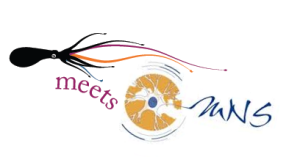WG3 CephsInAction meets MNS
CephsInAction WG3 meeting – Cagliari 2015
WG3 CephsInAction meets MNS
 Our FA1301 COST Action will start the series of the meetings of the 2015 with a networking initiative of the Working Group 3 (Neurophysiology, Anaesthesia and Humane end-points) joining the Mediterranean Neuroscience Society meeting (Cagliari – Italy; 12th – 15th June, 2015).
Our FA1301 COST Action will start the series of the meetings of the 2015 with a networking initiative of the Working Group 3 (Neurophysiology, Anaesthesia and Humane end-points) joining the Mediterranean Neuroscience Society meeting (Cagliari – Italy; 12th – 15th June, 2015).
FA1301 WG3, together with representatives of WG4 and WG5, will convene and contribute to MNS2015 main program with a dedicated symposium (June 15). A series of other contributions (posters and free oral presentations) will be delivered during the main program.
The FA1301 WG meeting will occur as satellite event of MNS2015 meeting on Tuesday 16 June.
Aims
CephsInAction will provide the latest discoveries on cephalopod neuroscience and will also contribute to the main MNS2015 meeting by soliciting leading scientists, working on other invertebrate species, to provide their expertise, discoveries and enthusiasm.
For details see the program on MNS website.
More than 400 participants are expected to attend the MNS2015 meeting in Cagliari, and this will offer exceptional networking opportunities to CephsInAction members.
CephsInAction will face with a general and specialist ‘neuroscience’ context with the sake to facilitate a general overview on the relevance and actuality of cephalopods as animals to be used for the neuroscience. We will also benefit of the presence of neuroscientists with experience on other organisms thus to facilitate networking, increase the potential of people working on key aspects of cephalopod neuroscience, and finally facilitate a better coordination of the overall WG3-FA1301 scientific planning.
CephsInAction believes that our presence – although limited in number – at MNS2015 will facilitate the interaction of scientists actively working on neuroscience with different species with our “community”, thus to facilitate and increase their active participation and interest, and to allow the growth of the field and of the research effort using cephalopods.
Topics included in WG3 contribution will span from vision and visually-controlled behavior, neural connectivity, modulation of behavior, neural morphology, learning and cognition. FA1301 WG3 meeting will include scientific sessions and a discussion of the operations and activities to be coordinated by the community to facilitate CephsInAction goals.
CephsInAction meets MNS2015 occurs 30 years after the publication of “Cephalopod and Neuroscience” written by J. Z. Young (1985) appeared in the June 1st issue of Biological Bulletin.
A multi-author review paper/special issue based on “Cephalopod Neuroscience 30 years afterwards” and some of the outcomes of the scientific activities of FA1301 WG3 is also planned to be prepared after the meeting; this will be hosted in some leading scientific journals.
Program
| Friday, 12 June – 2015 |
CephsInAction meets MNS*
14.00 – 14.30 Presentation of COST ACTIONS
L. Della Corte (on behalf of COST Action CM1103) & G. Fiorito (on behalf of COST Action FA1301)
| Monday, 15 June – 2015 |
CephsInAction meets MNS
Symposium CephsInAction
11.30 – 13.15 Joint Symposium with COST Action FA1301: CephsInAction meets MNS2015 – I. Kemenes, G. Fiorito, chair
– What does the future hold for invertebrate neuroscience? – L. Holden-Dye (UK)
– Conservation and convergence in the evolution of the octopus neural system mediating learning and memory – T. Shomrat (Israel)
– Identifying molecular and connectivity architecture shared in mammalian and octopus brains – S. Shigeno (Japan)
– Octopamine in Octopus brain: a long history of mapping a ‘neglected’ neuromodulator – G. Ponte (Italy)
– Why Motor Control in the Octopus is “Full of Surprises” – B. Hochner (Israel)
17.15 – 19.00 Oral (free) Communications
– A two-neuron system for goal-directed decision-making in the defined feeding network of Lymnaea stagnalis – G. Kemenes (UK)
– Differential engagement of a pharyngeal circuit to suppress feeding during food deprivation – L. Holden-Dye (UK)
– Evolutionary conserved mechanisms of associative learning in Lymnaea – I. Kemenes (UK)
| Tuesday, 16 June – 2015 |
FA1301 – WG3 Meeting
- Lindy Holden-Dye & Graziano Fiorito – coordinators and chairs
Listed in alphabetic order
Perceptual laterality in cuttlefish – C. Alves Jozet (France)
Of models and brains. Octopuses and brain science (ca 1950s-2000s) – F. De Sio (Germany)
Mapping putative sensory nociceptive inputs in the suckers of Octopus vulgaris – G. Di Cristina (Italy)
Nervous control in Octopus vulgaris; a physiologist point of view – C. Di Cristo (Italy)
Is there a preference for symmetry in Octopus vulgaris? – F.D. Hanke (Germany) –
Self-recognition mechanism between skin and suckers prevents octopus arms from interfering with each other – N. Nesher (Israel)
Facilitated Discussion on:
- Anesthesia: cephalopods and invertebrates (including a report on the control of cardiac performance during anesthesia, the case of octopus)
- Research in Physiology and the requirements of the Directive 2010/63/EU
- Humane killing
- Effects of noise on the welfare of animals
- Cephalopod neuroscience 30 years after J.Z. Young 1985
- Update on the work from other CephsInAction WGs
- Goals of WG3; contributions from WG4 and WG5
* Only presenters are listed
| M | T | W | T | F | S | S |
|---|---|---|---|---|---|---|
| 1 | 2 | 3 | 4 | 5 | 6 | |
| 7 | 8 | 9 | 10 | 11 | 12 | 13 |
| 14 | 15 | 16 | 17 | 18 | 19 | 20 |
| 21 | 22 | 23 | 24 | 25 | 26 | 27 |
| 28 | 29 | 30 | ||||
This website is supported by COST, European COoperation in Science and Technology


